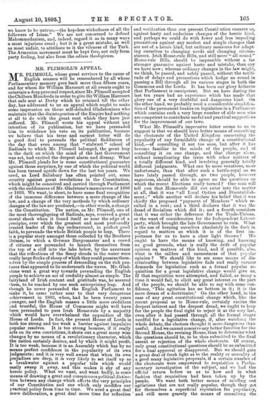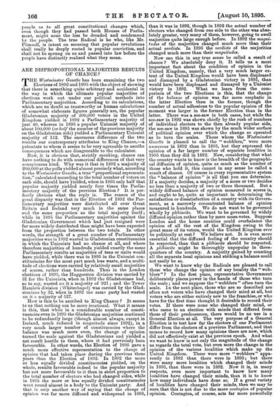MR. PLIMSOLL'S APPEAL.
MR. PLIMSOLL, whose great services to the cause of English seamen will be remembered by all whose Parliamentary memory goes back more than fifteen years, and for whom Sir William Harcourt at all events ought to entertain a deep personal respect, since Mr. Plimsoll accepted the Chiltern Hundreds in order to give Sir William Harcourt that safe seat at Derby which he retained till the other day, has addressed to us an appeal which ought to make some impression on those self-deluded Gladstonians who maintain that the disintegration of the Empire had nothing at all to do with the great rout which they have just suffered. Mr. Plimsoll wrote his appeal without any intention of its publication, but we have persuaded him to withdraw his veto on its publication, because we believe that his terse and earnest letter will do a good deal to persuade the political Sadducees of the day that even among that " stalwart " school of Radicals to which Mr. Plimsoll belonged, the great leap in the dark on which the mind of the last Government was set, had excited the deepest alarm and dismay. What Mr. Plimsoll pleads for is some constitutional guarantee against those surprises, by one of which the political world has been turned upside down for the last ten years. We need, as Lord Salisbury has often pointed out, some security against great revolutions in the Constitution, which might be conceived and carried through Parliament with the suddenness of Mr. Gladstone's manceuvres of 1886 or 1893. We want, in short, to have some final recognition of the immense difference between a mere change of the Law, and a change of the very methods by which ordinary changes of the law are produced,—in other words, a change in the Constitution. The nation, as Mr. Plimsoll, one of the most thoroughgoing of Radicals, says, received a great moral shock when it found itself so near the edge of a precipice, over which the greatest and most profoundly trusted leader of the day endeavoured, in perfect good faith, to persuade the whole British people to leap. There is a popular story amongst those collected by the Brothers Grimm, in which a German Burgomaster and a crowd of citizens are persuaded to launch themselves from the top of a cliff into the lake below, by the assurance that the reflections of the fleecy clouds in the water were really large flocks of sheep of which they could possess them- selves by the simple process of descending on the rich pas- tures that appeared to lie underneath the waves. Mr. Glad- stone went a great way towards persuading the English people to achieve an act of credulity almost as simple. The fairyland of Irish content and gratitude was, he assured them, to be reached by one such enterprising leap. And though he never persuaded the English Parliament to make it, he came rather near to that very dangerous achievement in 1893, when, had he been twenty years younger, and the English masses a little more credulous and trustful, the House of Commons might well have been persuaded to pass Irish Home-rule by a majority which would have overwhelmed the opposition of the House of Lords. In fact, the present House of Lords is both too strong and too weak a barrier against impulsive popular resolves. It is too strong because, if it really acts on its own convictions, it shuts out a great many wise changes by no means of a revolutionary character, which the nation certainly desires, and by which it might profit. It is too weak, because it is an Assembly which has by no means perfect confidence in the popularity of its own judgments ; and it is very well aware that when its own prejudices are deep, it is very likely to set itself up as a breakwater against a popular tide which would easily sweep it away, and this makes it shy of any heroic policy. What we want, and want badly, is some means of drawing a great and conspicuous political distinc- tion between any change which affects the very principles of our Constitution and one which only modifies our practical policy from time to time. We need a great deal more deliberation, a great deal more time for reflection and verification than our present ConstPution ensures us, against hasty and audacious changes of the heroic kind, and perhaps we could do with fewer and less impeding precautions against any modest and simple changes that are not of a heroic kind, but ordinary measures for adapt- ing ourselves to changing needs and changing circum- stances. Irish Home-rule Bills, and still more "all round" Home-rule Bills, should be impossible without a far stronger guarantee against haste and mistake, than any we have now ; whereas ordinary changes in the law might, we think, be passed, and safely passed, without the multi- tude of delays and precautions which hedge us round in passing a Bill through all its various stages in both the Commons and the Lords. It has been our glory hitherto that Parliament is omnipotent. But we have during the last ten years had an experience which has made that glory one of a very doubtful and dangerous kind. On the other hand, we probably need a considerable simplifica- tion of the permanent brakes on legislation in a Parliament which contains such a very large number of able men who are competent to contribute useful and practical suggestions for the improvement of our laws.
What Mr. Plimsoll's impressive letter seems to us to suggest is that we should have better means of consulting the electorate of the United Kingdom concerning the popularity of any formidable change of a constitutional kind,—of consulting it not too soon, but after it has become familiar to the minds of the people, an 1 of consulting it on one change, and that change alone, without complicating the issue with other matters of a totally different kind, and involving generally totally different judgments. What can be more vexatious, more unfortunate, than that after such a battle-royal as we have lately passed through, no two people, however sagacious, should be able to agree on the questions on which the recent Elections really turned ? One man will tell you that Home-rule did not enter into the matter at all, that it was "all Local Option and Disestablish- ment ; " while another will declare his belief that it was chiefly the proposed "payment of Members" which re- sulted in a rout ; and a third declares that it was the dread of Socialism which did it ; and a fourth considers that it was either the deference for the Trade-Unions, or the want of consideration for the Independent Labour party, which brought the late Government to ruin. What is the use of keeping ourselves absolutely in the dark in regard to matters on which it is of the first im- portance for us to have a clear light thrown ? We ought to have the means of knowing, and knowing on good grounds, what is really the drift of popular opinion on matters of this kind, and if possible, also, what is the calibre and earnestness of that popular opinion ? We should like to see some means of dis- criminating between legislative fads and really earnest demands for legislation such as a formal popular re- quisition for a great legislative change would give us. If that requisition were attempted, and failed, as many a. time it would fail, to elicit any great interest on the part of the people, we should be able to say with some con- fidence, This agitation has no bottom in it; it is the mere dream of a doctrinaire.' On the other hand, in the case of any great constitutional change which, like the recent proposal as to Home-rule, certainly excites the deepest interest and the deepest dread, we ought to keep for the people the final right to reject it at the very last, even after it had passed through all the formal stages needful for a legislative change, if, after watching the whole debate, the electors thought it more dangerous than useful. And we cannot conceive any better function for the Second House, the revising House, than to determine what the questions should be, to be thus submitted to the final assent or rejection of the whole electorate. Of course, only great constitutional questions should be so submitted for a, final approval or disapproval. But we should gain a great deal of fresh light as to the reality or unreality of a good many legislative proposals, if a certain number of the electorate were empowered to requisition a Parlia- mentary investigation of the subject, and we had the official return before us as to how and in what fashion that requisition had been taken up by the people. We want both better means of snuffing out agitations that are not really popular, though they get for themselves a, superficial reputation for popularity, I and still more gravely the means of consulting the people as to all great constitutional changes which, even though they had passed both Houses of Parlia- ment, might none the less be dreaded and condemned by the people. The true Radical is he who, like Mr. Plimsoll, is intent on securing that popular revolutions shall really be deeply rooted in popular conviction, and shall not be sprung on us and passed into law before the people have distinctly realised what they mean.



































 Previous page
Previous page